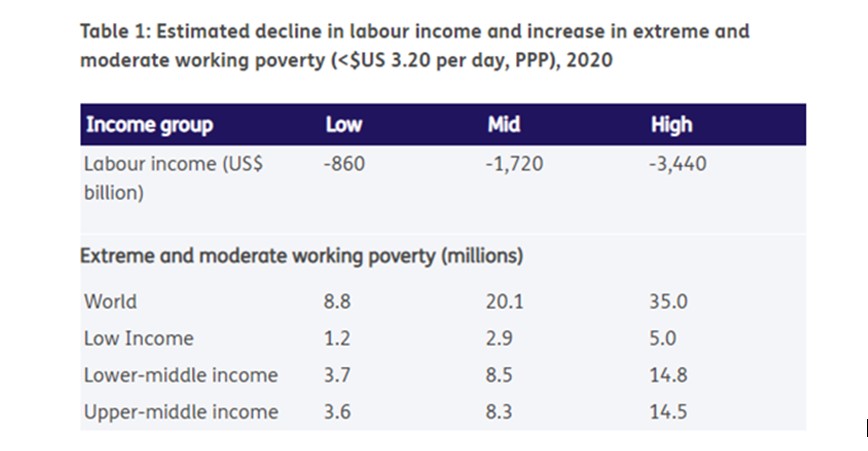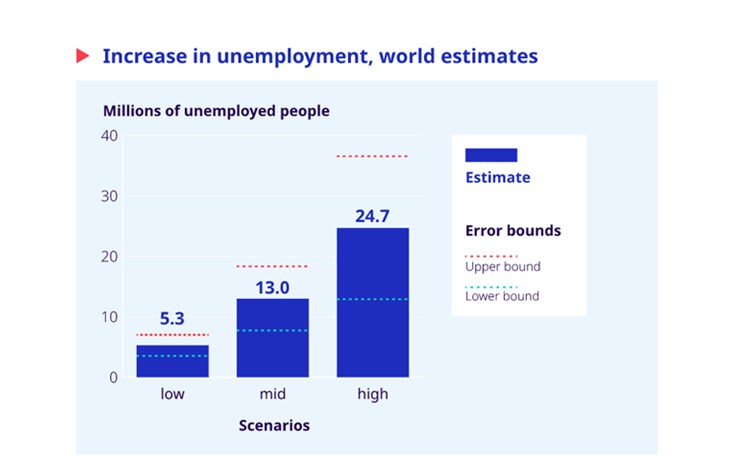Introduction
Apart from the health sector, the economy, the education sector and many others, the unprecedented COVID-19 pandemic has caused harm to the industrial sector worldwide also and thereby affecting both the employee and employer of the companies. Be it a corporate firm, a factory, or a small-sized business shop, everyone has to face the impact of the nation-wide lockdown which was necessary to stop the spread of this highly contagious virus.
Although the government has allowed the working of businesses providing essential-goods during the pandemic, they still have to face the inevitable impact of the supply chain being shut down. Due to all these reasons and pressure, employers also face difficulties in managing their employees and their workers. This gives birth to the need for reevaluating Labour Laws, analyzing the rights of employees and the obligations of employers.
In this article, we will understand the impact of COVID crisis on the labour laws by highlighting all the government orders, notifications and various relaxations provided by the Centre. In the end, we will highlight the challenges which will be faced regarding labour laws regardless of white-collar or blue-collar jobs.

Analysis of the Government orders and notifications
To minimize the grave impacts faced by companies who are on the verge of shut down, endangering the lives of the employees, the government has taken various steps by releasing orders for the employers and employees with an aim to calm down the panic, anxiety and fear of unemployment persisting in the minds of people. Some of these notifications and orders, one must be aware of are:-
Working during the Lockdown
The employees of the companies which have been closed due to the lockdown can be made to work from home depending upon the nature of the work involved. Also, through a formal communication made on 20th March 2020 by the Ministry of Labour , it has been ordered that the establishments which have been completely shut down due to the lockdown, and the same is non-operational, then also the employees of the company shall be deemed to be ‘on duty’. The employers were also advised to acquaint themselves with the State Governments advisories/orders which have been released in their area of jurisdiction.
Remuneration
The Ministry of Home Affairs has also issued an order wherein the point (iii) explicitly points out that the employers need to pay the salary or wages of their employees without any deduction. This applies to the employers’ of industries, shops or commercial outlets, to pay the remuneration of the employees on the due date.
Also, on 29th March 2020, the Ministry of Home Affairs (MHA) took into consideration the migrant workers where it was necessary to mitigate their economic stress, and due to which the order restricting their movements said that they shall be paid the wages without any deductions.
Termination of Employment
Another important clarification made by the government via their advisories and directions is that the employer can not reduce or downsize the workforce due to the business slowdown, even in case the establishment has been completely non-operational during the lockdown . State governments of Gujrat, Haryana, Telangana and Karnataka had issued advisories stating that the employers should refrain from terminating the employment of their workers. Apart from the said States, Uttar Pradesh and the Labour Commissioner of Kanpur also released their notices. It is advisable for employers to check the State advisories of their place of establishments, and comply with the same.
However, in cases where no advisories or notices have been released by the respective State Governments, the employers of the companies can terminate or downsize their workforce as per the terms and conditions of the employment contracts entered between the employer and the employee.
- https://www.mha.gov.in/sites/default/files/MHA%20Order%20restricting%20movement%20of%20migrants%20and%20strict%20enforement%20of%20lockdown%20measures%20-%2029.03.2020.pdf
- https://www.mha.gov.in/sites/default/files/MHA%20Order%20restricting%20movement%20of%20migrants%20and%20strict%20enforement%20of%20lockdown%20measures%20-%2029.03.2020.pdf
- https://labour.gov.in/sites/default/files/file%201.pdf
Exhausting the annual leaves
As earlier mentioned, the employees of the establishments which have been completely non-operational due to the lockdown are to be considered on duty. Thus the employers can’t compel the employees to exhaust their annual leaves and have to give paid leaves to its workers. According to the instructions dated 30th March 2020 by the Chief Labour Commissioner, the employers are advised not to terminate or exhaust the leaves of its employers who are unable to attend the offices.
This has been done so that the employees or the workers which have been showing symptoms of the novel coronavirus can self-isolate and quarantine themselves. Thus, the employer and the establishments can’t compel the employees to exhaust their annual leaves. Joint Statement by IOE and ITUC
The International Organisation of Employers(IOE) and the International Trade Union Confederation(ITUC) recently released a joint statement calling the authorities both national and international to take urgent action with a sense of responsibility. Some of these areas of actions which need attention as per IOE and ITUC are:-
❏ Protecting the livelihood by securing business continuity, providing income security and solidarity to the public.
❏ The need of the social partners and social dialogue to help in preventing massive job losses and unemployment by fostering stability.
❏ Making the policy coordination procedure an essence and bringing together organizations like WHO and ILO to tackle the social and economic consequences of the pandemic by the means of the collaboration of workforce and resources.
Relief package for employers
The Employees Provident Fund Organisation (EPFO) recently issued a notice announcing a package for the employers under the PMGY(Pradhan Mantri Garib Yojana) where the government will be paying 24% of the wages of the employees for the companies which have less than 100 employees and 90% of the employees of the establishments have a salary of not more than Rs. 15,000 per month.
The date of filing for the Unified Online Annual Returns as per the 8 labour laws has also been extended to 30th April 2020.
- https://clc.gov.in/clc/sites/default/files/mygov_15855558681.pdf
- https://www.ilo.org/wcmsp5/groups/public/—ed_dialogue/—actrav/documents/genericdocument/wcms_739522.pdf
- https://www.epfindia.gov.in/site_docs/PDFs/EPFO_PRESS_RELEASES/PR_PMGKY.pdf
Impact on Labour Laws pre & post lockdown
The disruptions caused the legal fraternity to reassess the labour laws and evaluate the liability of the employers and the rights of an employee during this pandemic and after the crisis. The following are some laws which will be impacted pre and post the lockdown period:-
Employees Provident Funds (Amendment) Scheme 2020
To release some burden from companies and individuals affected due to the pandemic, the Finance Minister made some changes to the Employees’ Provident Funds and Miscellaneous Provisions Act, 1952 (‘EPF Act’) by allowing an individual to withdraw a non-refundable provident fund. This has been made effective from 28th March 2020.
There is a limit also, which has been set, i.e. the employee or the member can withdraw the basic wage and dearness allowances of up to 3 months, or up to 75% of the amount which is available in the employees/member’s account, whichever is less.
- https://clc.gov.in/clc/sites/default/files/mygov_15846889651.pdf
- https://www.epfindia.gov.in/site_docs/PDFs/Downloads_PDFs/EPFAct1952.pdf
Reimbursement of stipend under NAPS during the lockdown
The Ministry of Skill Development and Entrepreneurship released an office memorandum where clarifications were made on the payment of stipend under the National Apprenticeship Promotion Scheme and it was stated that the government will be paying a stipend for the lockdown period.
Challenges ahead
The labour market has surely been impacted by the subsequent shocks to the economic sector. As per the International Labour Organization(ILO), there will be grave consequences to the employment sector due to the nationwide lockdowns being imposed in every other country.
The preliminary reports of ILO as per Annexure 1 state that there will be a surge in unemployment across the globe once the lockdowns are released, and this can be of around 5.3 millions as a low scenario and 24.7 million as a high scenario.
Most Vulnerable sections of the society are the women workers, the unprotected workers such as the medical workers, or those involved in the disposing process of biomedical waste, etc who are exposed to the virus and also the migrant workers who are mostly the ‘daily wage labourers’.
- http://apprenticeship.gov.in/Pages/FileDownload.aspx?fileId=701
- https://www.ilo.org/global/topics/coronavirus/impacts-and-responses/WCMS_739050/lang–en/index.htm

Conclusion
Taking into consideration the unprecedented situation, and the nature of circumstances faced across the globe, there is a need to reform the labour laws, but not just to protect the interest of the employees or workers, but also the employers. The reason being the unknown time period of the pandemic caused due to the spread of the virus, whose vaccine still hasn’t been prepared.
It has been a critical matter and the need of the hour is to provide support to the workforce in all possible manners. Also, it is more likely that the lockdown period would be extended on 03.04.2020 with some relaxations, which makes it reasonable to carefully observe the legislative changes made by the Government.